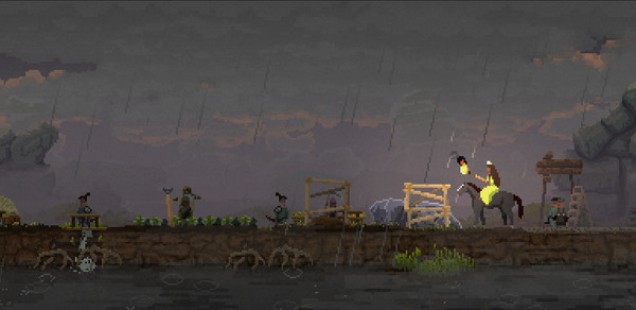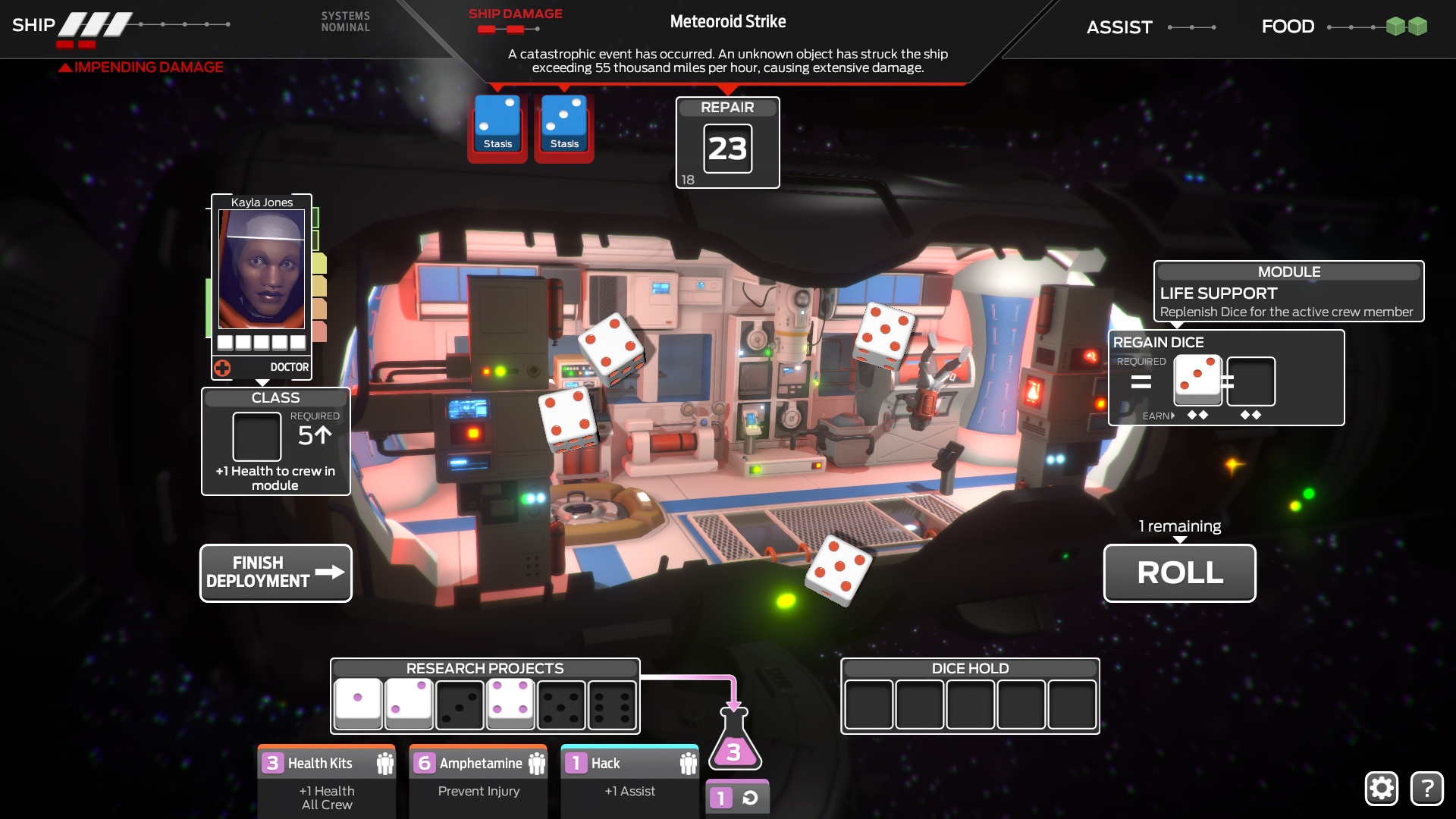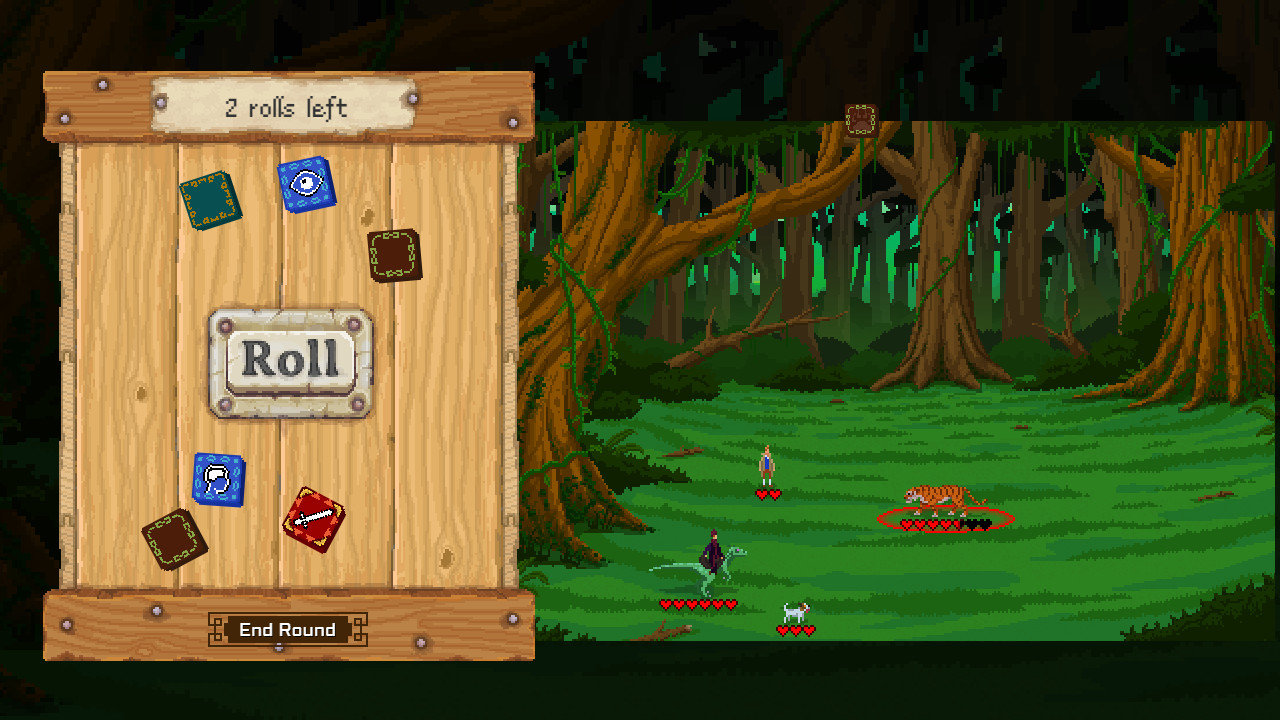
2015: The Year of Roguelikes
Today’s post brings you handcrafted words on the procedurally generated Kingdom, Downwell, Tharsis, and The Curious Expedition.
Kingdom
Kingdom takes me right back into my childhood. Not because of the graphics, but because it is one of those rare titles nowadays that are brave enough to leave you in the dark about their mechanics, their goals and their topics. You should absolutely start Kingdom without consulting guides. Just find out how to build your walls and kill your enemies by trying. You will die some frustrating deaths, some mechanics will seem unfair until you understand what they are supposed to do, but in the end you will be satisfied. Kingdom is about the journey, not the destination. I still don’t know what the final destination actually is.
In Kingdom, you take the role of a wandering monarch who decides to settle down with a campfire and some peasants in a forest. Capitalism is key in those realms, and everything depends on the coins in your purse. Peasants need coins to work, tools take coins to buy. Walls and watchtowers are built with coins. Monsters try to take your crown, but first they grab your coins. Farming crops actually produces coins somehow. First and foremost, Kingdom is a management strategy game, where you passively assign your peasants to the tasks you hope are the most useful. Secondly, Kingdom is a brutally difficult survival game, because every night the monsters try to breach your walls and take your royal head. Evaluation and misjudgement are part of the fun. Chop down to many trees? You might lose a peasant-spawning hut in the process, yet win land for a farm or another watchtower.
Also, the atmosphere is unchallenged. The combination of vague yet beautiful pixel painting and calm, mysterious ambient music always sets the mood for another round of „I don’t know what I do, but this time I died later than before“. Give it a try.
Pascal is recommending games on Buy Some Indie Games when he’s not blogging about them in German on Polyneux and his own blog. If you want to follow him on Twitter, be prepared for a lot of Metal Gear Solid and PlayStation Vita love.

Downwell
Downwell had some of the tightest controls of any game I played last year. It’s a game that immediately shows off how controlled and chaotic of an experience it can be. This balance between the control and chaos, is what kept me playing it over and over.
In Downwell, you play as a small character falling down a well. While you fall, you use your gun-boots to both destroy enemies and control your fall. I say “control”, but you learn early on that Downwell can quickly become frenetic chaos. Enemies will begin spawning both below and above you. The combat is prevented from becoming too overwhelming by the inclusion of several caves in each stage. These serve as rest stops along your fall. Each cave has a bubble around its opening that freezes time once you’re inside it. These caves will also have a, usually much needed, heart and power-up in them. Many times I found myself hurtling towards these caves just to have a second to regroup.
The gameplay alone was enough to keep me immersed in Downwell, but the art, music, and sound effects make it truly great. The sound effects of the gun-boots are particularly good. This is important as it will be the sound effect you will be hearing most often throughout the game. The sound effects, along with the chunky pixel art, give a real punch to the combat in the game. It all combines together to make a memorable experience.
In Downwell, you fall down a well and shoot enemies. It sounds simple, but the result is a perfect mix of tight controls, chaotic combat, great level design, and awesome sound. Also, if you’re wondering why it is you’re falling down a well, you’ll have to see for yourself. I will just say that the ending does not disappoint.
Jake Crump is a writer based in Louisiana, where he lives with his wife and three rescue dogs: Eliza Doolittle, Captain von Trapp, and Dorothy Gale. You can find more of his work on his blog, TheDweebJar, and follow him on Twitter.

Tharsis
There are a lot of games set in space, both for thematic reasons and the obvious development benefits of a mostly empty environment, and I’m consistently disappointed with their focus on bombastic combat or grand strategizing over the wondrous achievement of travelling between stars to begin with. This gripe has become slightly less accurate since Kerbal Space Program started a new branch of physics sandboxes focused on space faring, but I still maintain that the setting has endless potential for scarcity simulators in the vein of The Long Dark or Don’t Starve.
Tharsis is one of the few games that scratch that particular itch for me. The game leaves you in charge of a ship struck by disaster ten weeks from reaching Mars, managing the remaining crewmembers to fix the various components that break down week after week. Your main way of addressing these issues is rolling dice – fully simulated dice that bounce around on screen – and then using them to activate crew abilities or reduce repair values to fix ship modules.
With its obvious boardgame affectations, Tharsis runs counter to a lot of our digital expectations. Most videogames try to obfuscate their random number generation for the sake of immersion, but Tharsis wears its dice rolls on its sleeve. This has led to harsh criticism and middling reviews, calling the game out for relying so heavily on chance – something it certainly does, but not to a significantly higher degree than other games. As with any other roguelike, the joy of Tharsis lies in figuring out the many small ways in which you can mitigate the effects of its random generation.
Your dice roll doesn’t flat out determine what happens in a turn, just what you can do with it. Sometimes the best solution isn’t the most obvious, and there’s a remarkable amount of strategizing you can get up to even when the numbers aren’t in your favor. With good planning, you might just keep your crew alive until you reach Mars, or at least some of them. Or your ship might come apart at the seams, try as you might to hold it together. Such a fragile marvel of engineering.
Joe Köller founded Haywire, does German correspondence for Critical Distance, and occasionally writes for German sites such as Video Game Tourism, Superlevel, and WASD. You can follow him on Twitter, and support him on Patreon.

The Curious Expedition
Pixels and death. These are the first words that come to mind when trying to describe The Curious Expedition, a beautiful game which successfully combines the mechanics of roguelikes, turn-based strategy, and top-down procedural exploration. The technical execution of this game is as successful as the novel idea behind it. The Curious Expedition drops you in a 19th century setting where the race to discover treasures and fame in the new world has reached a fever pitch. You are tasked with choosing one of many famous icons such as Charles Darwin, Richard Francis Burton, Nikola Tesla, Amelia Earhart, Marcus Garvey, or Marie Curie. Once chosen, you are forced to select seemingly random characters (such as Mr. Winters the dog), each with their own special set of skills. Unlike Sunless Sea, there is no sense that when you pick a character or crewmate, you might be making a fatal mistake; however very much like Sunless Sea, you quickly realize how haphazard decision-making can get you killed or strand you insane and alone in a desert.
What I find most interesting about this game is the diverse cast: you have access to black, white, latino characters as well as male and female options. These characters aren’t merely repeats of one another – depending on which character you have chosen, you’ll find that the ending credits after each successful expedition change from person to person. In my case, I had chosen scientist Marie Curie whom after negotiating with “Natives”, finding treasure, and keeping her crew both sane and alive was greeted with a hero’s welcome – a welcome only to be mired with someone in the audience shouting “Exploring is man’s work!”. Whatever your own expedition happens to be, it is guaranteed that it will be filled with amazement, curiosities, and a painful dose of 19th century social norms.
Fred McCoy is the owner and Curator of CreativeFluff, a NYC art & design magazine. He loves interviewing artists, staring into the middle distance, and whispering sweet nothings to Twitter as @IAmFredMcCoy